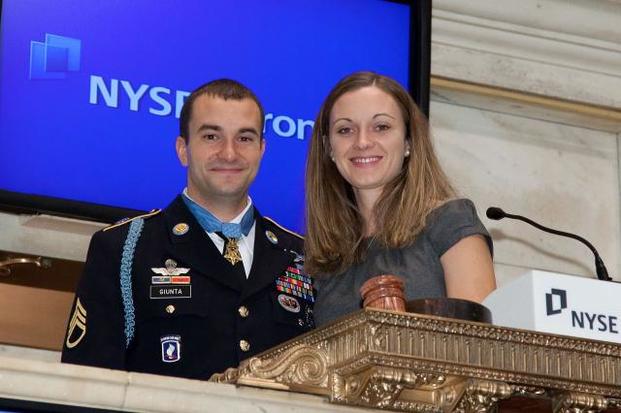"We didn’t have to talk about it. It was just best unsaid."
That’s what Sal Giunta, the first living Medal of Honor recipient since the Vietnam War, thought about talking to his family about what he had experienced during his deployments. And as the former Army Staff Sgt. with the 173rd Airborne Brigade Combat Team explained this to a room full of military spouses at the Military.com Spouse Summit last week, I couldn’t help but agree with him.
“I could talk to her about anything,” Giunta wrote in his memoir "Living With Honor” about the beginning of his relationship with his wife, Jen. “That would change in time, of course -- there were stories I didn’t share with Jen, scary stories about war and combat, things she didn’t need to know -- but for now I felt like I could tell her anything.”
In some military families, the typical rules of marital communication become blurry during and after a combat deployment. When my husband came back from Iraq the first time, I had no idea what to expect, no idea if he would tell me stories about what he had seen, what he had done, what he had experienced. The good, the bad, the ugly. He certainly didn’t share much while he was gone, and I figured he chose to censor his communication with me to keep me from worrying more than I already was.
But when he came home safe and sound, I wanted to know. I wanted him to be able to confide in me, to communicate with me like he used to when we sat at the dinner table together and shared the highlights of our days.
And then he showed me a photograph of a mortar round. On a bed. In his buddy’s hooch. That was right next to his. As he told me the story behind the photograph, my imagination filled in the blanks. I no longer wanted to know the whole story. And I’m not quite sure he wanted to tell me.
I thought of that photograph the day my husband came home and told me he was deploying to Iraq again. I thought of that photograph when we said goodbye. I thought of that photograph every time too many days passed without a phone call or an email. I thought of that photograph every day until he came home. That photograph stole any ability I may have possessed to live in denial about where he actually was and what could happen to him.
Sometimes leaving out certain details is beneficial for all parties involved.
“When I communicated with my parents, by phone or email, I resisted the urge to share any information beyond the merely superficial,” Giunta writes in his book. “And they accepted that tidy little summary of life, probably because it made things easier on them. It was like an unwritten contract: I’ll stay alive and come home to you; just don’t ask me what it’s really like.”
I know there are things my husband never told me about his deployments, things he probably never will. That seems to be our own unwritten contract. If he needs to talk about his deployment experiences, he turns to his military buddies, the guys who know what he’s been through because they’ve been through it themselves. They understand. They empathize.
As much as I’d like to, I will never be able to fully comprehend a life where a mortar round can show up anytime a few feet away from where I sleep. I think my husband recognizes that, and in turn, his reticence stems from a motivation to protect. I know as much as he has chosen to tell me. Everything else was better left unsaid.
Do you want to know all the details of your spouse’s deployments? Does your husband share those details with you or does he agree with Sal Giunta that some things are “best unsaid?”









